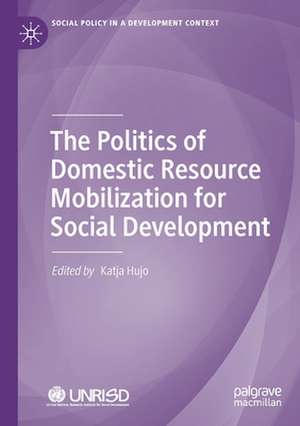The Politics of Domestic Resource Mobilization for Social Development: Social Policy in a Development Context
Editat de Katja Hujoen Limba Engleză Paperback – 8 iul 2021
The volume is unique in putting a spotlight on the political drivers of domestic resource mobilization in a rapidly changing global environment and in differentcountry contexts in Latin America, Asia and sub-Saharan Africa. It will appeal to a broad academic audience in the fields of economics, development studies and social policy, as well as practitioners, activists and policy makers.
| Toate formatele și edițiile | Preț | Express |
|---|---|---|
| Paperback (1) | 645.60 lei 6-8 săpt. | |
| Springer International Publishing – 8 iul 2021 | 645.60 lei 6-8 săpt. | |
| Hardback (1) | 651.19 lei 6-8 săpt. | |
| Springer International Publishing – 8 iul 2020 | 651.19 lei 6-8 săpt. |
Din seria Social Policy in a Development Context
- 15%
 Preț: 649.39 lei
Preț: 649.39 lei - 15%
 Preț: 649.54 lei
Preț: 649.54 lei - 15%
 Preț: 585.73 lei
Preț: 585.73 lei - 15%
 Preț: 643.34 lei
Preț: 643.34 lei - 15%
 Preț: 643.84 lei
Preț: 643.84 lei - 18%
 Preț: 953.82 lei
Preț: 953.82 lei - 15%
 Preț: 641.03 lei
Preț: 641.03 lei - 15%
 Preț: 640.06 lei
Preț: 640.06 lei - 15%
 Preț: 647.40 lei
Preț: 647.40 lei - 15%
 Preț: 649.06 lei
Preț: 649.06 lei - 15%
 Preț: 644.30 lei
Preț: 644.30 lei - 15%
 Preț: 651.51 lei
Preț: 651.51 lei - 15%
 Preț: 644.63 lei
Preț: 644.63 lei - 15%
 Preț: 643.34 lei
Preț: 643.34 lei - 15%
 Preț: 585.73 lei
Preț: 585.73 lei - 15%
 Preț: 649.06 lei
Preț: 649.06 lei
Preț: 645.60 lei
Preț vechi: 759.54 lei
-15% Nou
Puncte Express: 968
Preț estimativ în valută:
123.53€ • 128.73$ • 102.29£
123.53€ • 128.73$ • 102.29£
Carte tipărită la comandă
Livrare economică 03-17 aprilie
Preluare comenzi: 021 569.72.76
Specificații
ISBN-13: 9783030375973
ISBN-10: 3030375978
Pagini: 443
Ilustrații: XXXII, 443 p. 38 illus.
Dimensiuni: 148 x 210 mm
Greutate: 0.56 kg
Ediția:1st ed. 2020
Editura: Springer International Publishing
Colecția Palgrave Macmillan
Seria Social Policy in a Development Context
Locul publicării:Cham, Switzerland
ISBN-10: 3030375978
Pagini: 443
Ilustrații: XXXII, 443 p. 38 illus.
Dimensiuni: 148 x 210 mm
Greutate: 0.56 kg
Ediția:1st ed. 2020
Editura: Springer International Publishing
Colecția Palgrave Macmillan
Seria Social Policy in a Development Context
Locul publicării:Cham, Switzerland
Cuprins
1. The Politics of Domestic Resource Mobilization for Social Development: An Introduction.- Part I: Domestic Resource Mobilization through the Lens of Aid, Taxation and Mineral Rents.- 2. Fiscal Capacity and Aid Allocation: Domestic Resource Mobilization and Foreign Aid in Developing Countries.- 3. Domestic Resource Mobilization for Social Transfers in Sub-Saharan Africa: Can Foreign Aid Act as a Catalyst?.- 4. How Can Governments of Low-Income Countries Collect More Tax Revenue?.- 5. Colonial Legacies and Social Welfare Regimes in Africa: An Empirical Exercise..- 6. Democratic Deepening and State Capacity: Taxation in Brazil and India.- 7. Power and Politics: Taxation, Social, and Labour Market Policies in Argentina and Chile, 1990-2010.- 8. Sharing the Wealth: The Politics of Subnational Distribution of Natural Resource Revenues.- Part II: The Politics of Domestic Resource Mobilization: Case Studies.- 9. Domestic Resource Mobilization for Social Development in Bolivia (1985-2014): Protests, Hydrocarbons and a New State Project.- 10. The Political Economy of Domestic Resource Mobilization in Nicaragua: Changing State-Citizen Relations and Social Development.- 11. The Political Economy of Resource Mobilization for Social Development in Uganda.- 12. The Politics of Resource Bargaining, Social Relations and Institutional Development in Zimbabwe Since Independence.- 13. The Politics of Domestic Resource Mobilization for Social Development – Conclusions.
Notă biografică
Katja Hujo is a Senior Research Coordinator at the United Nations Research Institute for Social Development (UNRISD), Switzerland.
Textul de pe ultima copertă
At a time when the development community is grappling with the challenge of raising the required investment—estimated in the trillions of dollars—for attainment of the Sustainable Development Goals (SDGs), countries’ mobilization of their own fiscal revenues is receiving increasing attention. This edited volume discusses the political and institutional contexts that enable poor countries to mobilize domestic resources for global commitments and national development priorities. It examines the processes and mechanisms that connect the politics of resource mobilization and demands for social provision; changes in state-citizen, state-business and donor-recipient relations associated with resource mobilization and allocation; and governance reforms that can lead to improved and sustainable public revenues and services.
The volume is unique in putting a spotlight on the political drivers of domestic resource mobilization in a rapidly changing global environment and in different country contexts in Latin America, Asia and sub-Saharan Africa. It will appeal to a broad academic audience in the fields of economics, development studies and social policy, as well as practitioners, activists and policy makers.
Caracteristici
Reviews countries' mobilization of fiscal revenues as relevant in light of the SDGs Examines specific country contexts in the Global South Considers how domestic resources and politics connect with the delivery of social services for development
